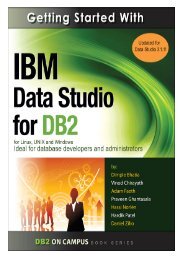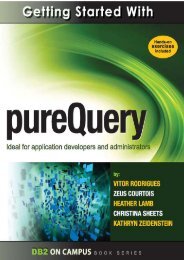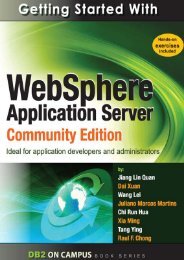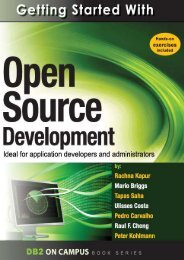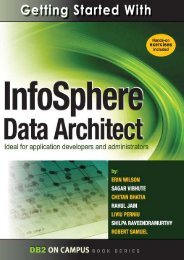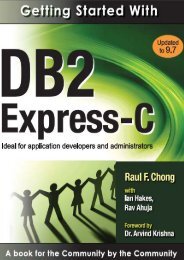Managing Computers in Large Organizations
Create successful ePaper yourself
Turn your PDF publications into a flip-book with our unique Google optimized e-Paper software.
<strong>Manag<strong>in</strong>g</strong> Microcomputers <strong>in</strong> <strong>Large</strong> <strong>Organizations</strong><br />
http://www.nap.edu/catalog/167.html<br />
About this PDF file: This new digital representation of the orig<strong>in</strong>al work has been recomposed from XML files created from the orig<strong>in</strong>al paper book, not from the<br />
orig<strong>in</strong>al typesett<strong>in</strong>g files. Page breaks are true to the orig<strong>in</strong>al; l<strong>in</strong>e lengths, word breaks, head<strong>in</strong>g styles, and other typesett<strong>in</strong>g-specific formatt<strong>in</strong>g, however, cannot be<br />
reta<strong>in</strong>ed, and some typographic errors may have been accidentally <strong>in</strong>serted. Please use the pr<strong>in</strong>t version of this publication as the authoritative version for attribution.<br />
MANAGING MICROCOMPUTERS AND END-USER COMPUTING SOME CRITICAL<br />
ISSUES<br />
not previously available. Internal security is ultimately still a matter of audit<strong>in</strong>g<br />
and personnel policies, not technology.<br />
The f<strong>in</strong>al set of issues are those that, I believe, can be resolved <strong>in</strong> most<br />
organizations by normal adm<strong>in</strong>istrative procedures and proper computer-user<br />
<strong>in</strong>terfac<strong>in</strong>g. These issues are the effects of bad data, data <strong>in</strong>tegrity, the problem<br />
of transferr<strong>in</strong>g end-user-developed programs, and the question of who pays for<br />
added computer capacity, the wast<strong>in</strong>g of resources, and the proliferation of<br />
languages.<br />
Poor Data. Are decisions supported by computer-based analysis deficient<br />
because of poor data? This may be an important question where data from<br />
outside sources are used. The quality of outside data must be checked just as the<br />
quality of received parts or materials is checked. (In a few places it may be<br />
advisable to check the quality of the <strong>in</strong>ternal data as well.) Data quality really<br />
<strong>in</strong>volves two questions. Is the decisionmaker better off with no data or with data<br />
that may have some errors? If flawed data are used will the power of the<br />
computer-based analytic tools <strong>in</strong> some way amplify the errors?<br />
There are several responses to this problem. Obviously, care should be<br />
taken to prevent bad data whether micros, term<strong>in</strong>als, or add<strong>in</strong>g mach<strong>in</strong>es are<br />
be<strong>in</strong>g used. In each case the end user is more likely to know the data and<br />
therefore be better able to catch errors than corporate staff or others. In fact, the<br />
power of the computer may help the end user f<strong>in</strong>d errors by perform<strong>in</strong>g various<br />
consistency and trend analyses. Thus, end user access to data may have an<br />
additional benefit of mak<strong>in</strong>g the data more accurate. Further, the k<strong>in</strong>d of<br />
decision-support analysis we are discuss<strong>in</strong>g may be <strong>in</strong>sensitive to occasional<br />
data errors. Of course, management should always be aware that<br />
recommendations and analytic results may be based on poor data. End-user<br />
comput<strong>in</strong>g should not aggravate this situation if adm<strong>in</strong>istrative procedures are<br />
followed to keep the data as clean as possible and to rem<strong>in</strong>d the staff to check<br />
the data and the reasonableness of the results.<br />
Data <strong>in</strong>tegrity. Can the end user affect the operational data <strong>in</strong> corporate<br />
files? If so, can the <strong>in</strong>tegrity of the data be assured? Can the changes made by<br />
an end user be audited?<br />
The only way to <strong>in</strong>sure the <strong>in</strong>tegrity of data is to ma<strong>in</strong>ta<strong>in</strong> all the controls<br />
that data process<strong>in</strong>g has pa<strong>in</strong>fully learned: good edit<strong>in</strong>g, effective audit logs and<br />
procedures, and good recovery processes.<br />
89<br />
Copyright © National Academy of Sciences. All rights reserved.




